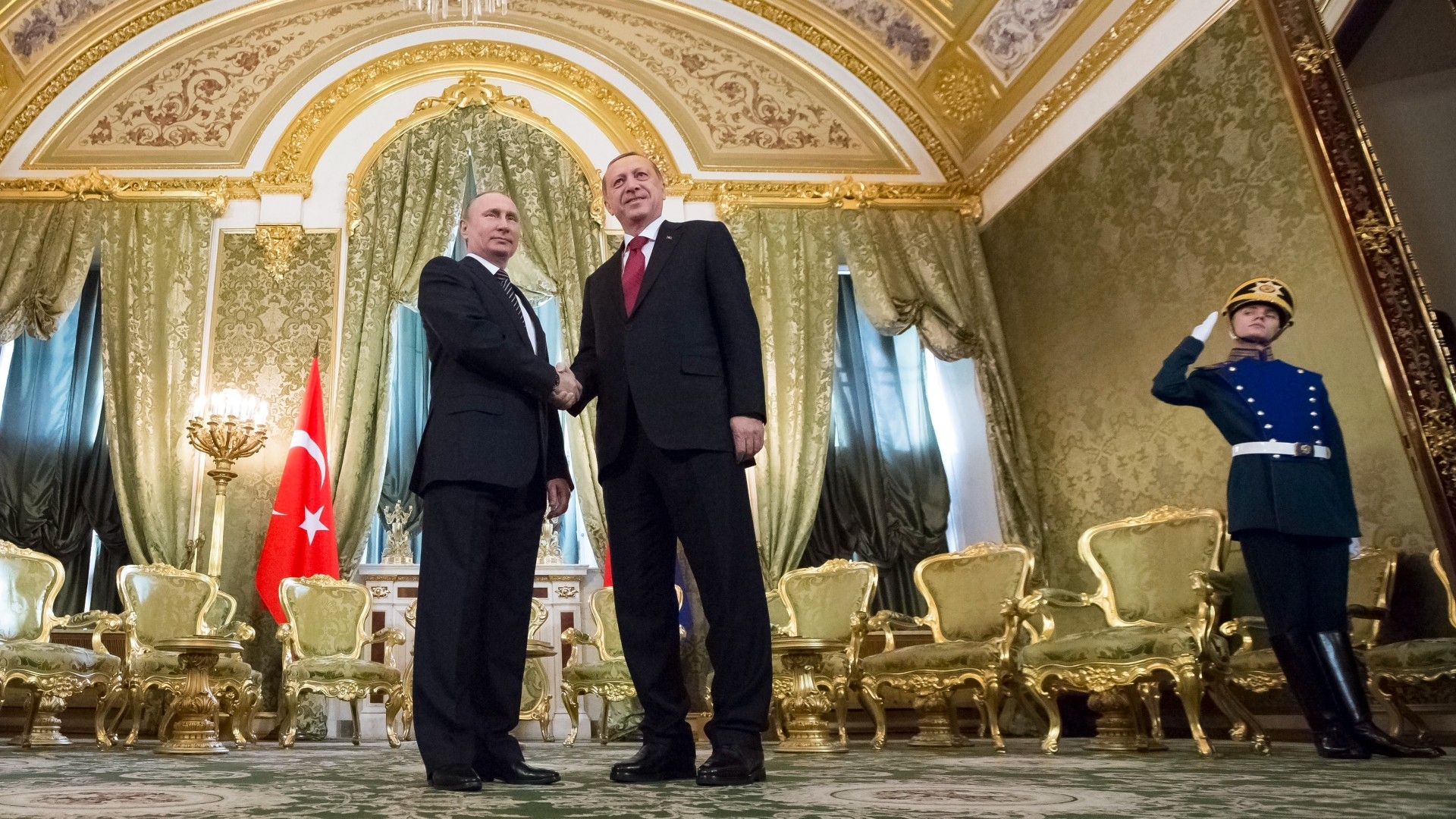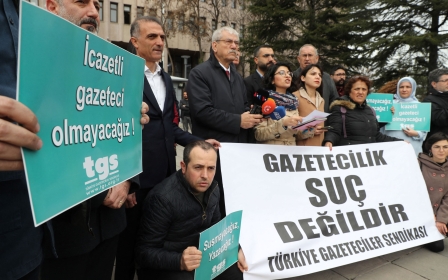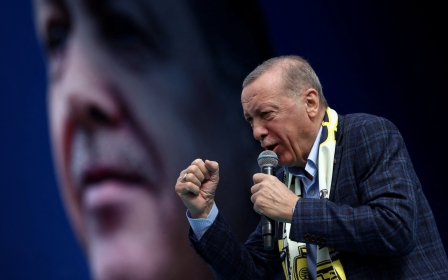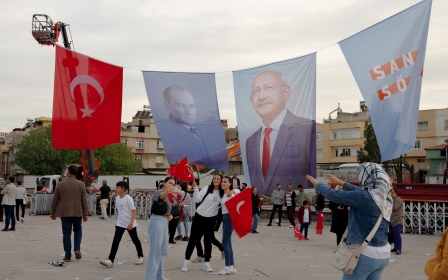Turkey elections: Why Kilicdaroglu suspects Russian interference

Turkish opposition presidential candidate Kemal Kilicdaroglu shocked many on Thursday when he openly accused Russia of trying to interfere with Turkey's presidential and parliamentary elections in two days' time.
“Russian friends, you are behind conspiracies, deep fake content and tapes that were revealed in this country yesterday,” Kilicdaroglu tweeted in Turkish and Russian. “If you wish for our friendship to continue after 15 May, take your hands off the Turkish state.”
On Friday, the Kremlin denied Kilicdaroglu's allegations.
“Moscow does not interfere in the internal politics of other states,” Kremlin spokesman Dmitry Peskov said. Peskov said Kilicdaroglu's sources were liars and Russia valued its ties with Turkey enormously.
Later, Kilicdaroglu told the media that he has “concrete evidence” to back his claims, saying he wouldn't have blamed Russia otherwise.
New MEE newsletter: Jerusalem Dispatch
Sign up to get the latest insights and analysis on Israel-Palestine, alongside Turkey Unpacked and other MEE newsletters
Kilicdaroglu’s claim came as breakaway opposition candidate Muharrem Ince withdrew from the race on Thursday, citing an online smear campaign he maintains is fake. Ince gave few details, though fake sex tapes and doctored pictures showing him cheating on his wife have reportedly been circulating online in recent days.
A senior Turkish opposition official, speaking on condition of anonymity due to the sensitivity of the subject, told Middle East Eye that there were many reasons to suspect Moscow’s interference in the elections in Turkey, citing the close ties between Turkish President Recep Tayyip Erdogan and his Russian counterpart Vladimir Putin.
“They have been funding Erdogan’s election campaign promises through several steps for the past six months with billions of dollars,” the official said. “Funding through the Akkuyu nuclear power plant, deferral of gas payments and so on and so forth.”
'There are some Russian companies that operate worldwide helping the Erdogan campaign here in Ankara'
– Turkish opposition official
Turkish Energy Minister Fatih Donmez revealed last week that Russia allowed Turkey to postpone some payments for energy imports, without going into detail.
The Turkish Central Bank is in dire need of foreign reserves to stabilise the Turkish lira amid a prolonged currency crisis. Reuters reported earlier this week that Russia has agreed to defer Ankara's payment of a $600m natural gas bill to 2024. The report also said up to $4bn in Turkish energy payments to Russia may be postponed until next year.
Last year, Russia transferred nearly $10bn to the Turkish Central Bank through funding for the Akkuyu nuclear power plant, which is being built in Turkey by Russian state company Rosatom.
The Turkish opposition official added that Putin’s remarks in April during a nuclear fuel delivery ceremony were not to be taken lightly.
Putin, in a lengthy speech, praised Erdogan for his leadership, saying that the construction of the plant was a convincing example of how much he is doing for his country, its economic growth and for the Turkish people. “I will put it straight: you are setting ambitious goals, and you are confidently implementing them,” he said.
Putin's role in Syria talks
The Turkish opposition official said Putin also helped Erdogan by brokering talks between Ankara and Syria at a time when Erdogan has come under fire over the presence of nearly 3.7 million Syrian refugees in Turkey.
Many voters are demanding a plan for their repatriation. With relations between Erdogan and Syrian President Bashar al-Assad historically poor, the Turkish opposition jumped on the popular sentiment by insisting the government could not deliver this wish.
Yet Turkish Foreign Minister Mevlut Cavusoglu met his Syrian counterpart Faisal Mekdad in Moscow four days ahead of the elections, a first meeting since 2011. Russia is the Syrian government's most important patron.
“The Russians did everything to bring both sides together before the elections,” the opposition official said. “Everything possible in Syria is done.”
The Russian government is believed to have interfered in domestic Turkish politics previously, notably soon after the 2016 coup attempt.
A couple of fake articles alleging US involvement in the attempted coup, with titles such as "Top US national security official admits Turkey coup", were pushed out by suspected Russian-controlled websites.
As for Kilicdaroglu’s assertion that Russia was also interfering in the Turkish elections with deep fake online content, the official said Moscow was directly supporting the Erdogan campaign.
“There are some Russian companies that operate worldwide helping the Erdogan campaign here in Ankara,” the official claimed. “The hackers, and all others, they doctor the images and footage."
The official said doctored campaign ad footage that shows Murat Karayilan, a notorious PKK leader accused of terror attacks, in cahoots with Kilicdaroglu was a Russian product. Erdogan screened the video at some campaign rallies, painting the opposition as being in bed with the “terrorists”.
The official declined to disclose the names of the alleged Russian companies, saying that the opposition doesn’t want to enter into a shouting match with the Russians as well as the government, which could be used against them during a tight and tense race.
On the other hand, a senior Turkish security official said the opposition must give the names of the Russian companies they suspect of electoral interference to the authorities for investigations.
The opposition official said that the Russians, through interlocutors, told them that Putin’s government doesn’t have anything to do with the said companies.
“They told us that they were private companies, they were mafia,” the official said. “We never directly blamed the government for the doctored images. We want to see Russians as our dear friends, we are neighbours.”
Middle East Eye has asked the Russian embassy in Turkey for comment.
Middle East Eye delivers independent and unrivalled coverage and analysis of the Middle East, North Africa and beyond. To learn more about republishing this content and the associated fees, please fill out this form. More about MEE can be found here.





